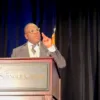A majority of California voters oppose making cash payments as a form of compensation to residents of the state who are the descendants of enslaved African-Americans, according to a new poll from the University of California, Berkeley.
The findings suggest a tough political road ahead for the effort to make California the first state in the nation to adopt a cash reparations program to atone for slavery’s legacy.
The poll of more than 6,000 registered voters found that only 23 percent supported cash reparations, compared to 59 percent who said they opposed them, and 13 percent who had no opinion.
“While a majority of California voters believe that Black Americans continue to be affected by the legacy of slavery, our poll is showing that there is no real strong support for cash reparations to deal with the situation,” said Mark DiCamillo, director of the Berkeley IGS Poll.
Among racial groups, Black voters were the only ones to support cash payments by a majority. Republicans almost unanimously opposed them, while Democrats split almost evenly on the question.
Cash reparations have long been a sticking point
Cash payments are the hallmark in the long list of recommendations that a state taskforce on reparations recently made to California lawmakers, following two years of conducting research, collecting testimony, and hosting public hearings across the state.
The taskforce — formed by the legislature with the support of Gov. Gavin Newsom – also recommended tax breaks, help with healthcare, free tuition and other programs to help Black Californians overcome disparities in wealth, health and education that the taskforce said were some of the lingering effects of slavery and its racist legacy.
The two Democratic members of the taskforce who are also state lawmakers – Senator Steven Bradford and Assemblyman Reggie Jones-Sawyer, both of Los Angeles – said it would be up to them to turn the recommendations into law. But both have since tried to moderate the public’s expectations about cash payments. In an interview on Monday following the release of the new polling, Jones-Sawyer stopped short of saying he would seek to include cash in the bill he and Bradford are aiming to introduce early next year.
“Reparations is more than just cash payments,” Jones-Sawyer said. “There’s a plethora of things in that report that we need to get through.”
Cash payments from government coffers have always been controversial and one reason the reparations movement has gained little traction nationally. California’s reparations taskforce created a formula for calculating individual payments, which for some people would ascend upwards of $1 million.
California is an important test case
Even so, many advocates have put their hope in California’s effort to breathe new life into the reparations movement, betting that success in California could motivate other states to adopt their own programs.
“California is an important test case,” said Tatishe Nteta, a political scientist at the University of Massachusetts, Amherst who has conducted national polling on public support for reparations. “If it does pass, I think it provides the momentum for the reparations movement that it has been looking for for 200-plus years. But if it doesn’t pass, it provides momentum for those who oppose reparations to make the case that in a state as progressive as California, if you can’t pass reparations, the likelihood of passing this at the national level is very low, and in other states is also very low.”
Nteta said the Berkeley poll’s findings on California voters mirror his own polling of Americans nationally.
“This is a relatively unpopular policy, and that’s been the case for the history of the United States,” he said, adding that, like in the California poll, Americans nationally who oppose cash payments cite not the cost to taxpayers, but a belief that African-Americans don’t deserve them. “They believe that debt died with their enslaved ancestors.”
Supporters say education is key
Assemblyman Reggie Jones-Sawyer said the low public support reflected in the Berkeley poll was not a surprise.
“We always expected we would have an education challenge,” he said. The California Reparations Taskforce recommendations were accompanied by roughly 1,100 pages of evidence of slavery’s ongoing impact on Black Californians, even though California was never a slave state. Now, Jones-Sawyer said, his colleagues in the Legislative Black Caucus are raising money for an educational campaign that condenses the report’s findings and makes them digestible for the general public.
Grassroots groups across the state – from Oakland, to East Palo Alto, to San Diego, are also working to educate their communities about the taskforce’s work in an effort to turn public sentiment in favor of reparations.
Khansa Jones-Muhammad is vice-chair of the Los Angeles Reparations Advisory Committee who has also advocated nationally in support of reparations. She is trying to raise money for an oral history and testimonial project that would convey slavery’s ongoing impact on Black Americans today. She was inspired, she said, by the work that Japanese-Americans did to educate the public about their internment during World War II as part of their successful 1980s campaign for reparations.
“We need to really show that these are lived experiences with people who are still alive,” Jones-Muhammad said. “And make this a human story and not a budgetary story. Because somehow I feel like the human factor gets significantly left out of these discussions and these polls.”
Copyright 2023 NPR. To see more, visit https://www.npr.org.


